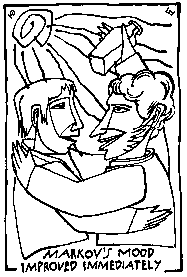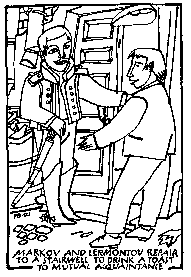More encounters
 1) Markov, in a state of light pokhmelye, meets Dostoyevsky getting off the No. 40 tram on Sredny Prospekt. Dostoyevsky, dressed in a dirty morning coat and faded top hat, is in one of his serious moods. When Markov proposes that they go and drink portwine in a neighbouring dvor, he refuses, referring to a meeting with his publisher. They shake hands and part company. Only when Markov is boarding the metro ten minutes later does he realise he has made a terrible mistake: this could not have been the real Dostoyevsky - who died ninety years ago. Sad that he could have been so deceived, Markov travels thoughtfully to Nevsky Prospekt. But then, leaving the station, he meets Pushkin at the top of the upward escalator. Pushkin agrees at once to go and drink portwine in Letny Sad. Markov's mood improves immediately.
1) Markov, in a state of light pokhmelye, meets Dostoyevsky getting off the No. 40 tram on Sredny Prospekt. Dostoyevsky, dressed in a dirty morning coat and faded top hat, is in one of his serious moods. When Markov proposes that they go and drink portwine in a neighbouring dvor, he refuses, referring to a meeting with his publisher. They shake hands and part company. Only when Markov is boarding the metro ten minutes later does he realise he has made a terrible mistake: this could not have been the real Dostoyevsky - who died ninety years ago. Sad that he could have been so deceived, Markov travels thoughtfully to Nevsky Prospekt. But then, leaving the station, he meets Pushkin at the top of the upward escalator. Pushkin agrees at once to go and drink portwine in Letny Sad. Markov's mood improves immediately.
2) Markov meets Petrovich at one o'clock one morning behind a poplar in Mikhailovsky Sad. Petrovich is leaning against the tree with his head resting heavily on his arm. Markov thinks for a moment that Petrovich is crying, but, as it turns out, he is merely relieving himself. "I'll tell you something sad, though," says Petrovich. "An old woman approached me today, weeping uncontrollably. She was collecting money to bury her nephew. The nephew, only twenty, was a nice boy, well brought-up. Didn't smoke. Didn't drink. Not a drop. But when he came out of the army his relatives laid on a big meal to celebrate. He had three glasses of samogon and collapsed. Dead".
There is silence. Then Markov says: "That just shows how dangerous it is not to drink in this city."
3) One day Markov, tired but in a pleasant state of pokhmelye, sees a familiar figure coming towards him up Nevsky Prospekt. As the figure draws closer, Markov recognizes the large ovular head, the scuffed and flaking face, the warm blue eyes. Swigging from the almost empty bottle of portwine he is carrying in one hand, he prepares to greet his acquaintance. But then something awful happens: Markov realizes that somehow he has managed to forget his friend's name.
Appalled, he ducks down a side-street.
Only when the figure has passed and is a safe distance down the street does Markov put a name to those achingly familiar features: he realises that the figure that has just gone by is himself, Volodia Bedulovich Markov.
 4) Markov meets Lermontov on the corner of Liteiny Prospekt and Pestelya. It is seven in the morning. Markov is struggling with an unresolved, wordy pokhmelye. Lermontov is on his way to fight a duel on Mars Field, so scarcely pretends to listen when Markov starts recounting his adventures of the night before. But then Markov mentions his acquaintance, Fyodor Mikhailovich, the writer. Lermontov stops walking. "Fyodor Mikhailovich - Dostoyevsky? You know Dostoyevsky?" "I was playing poker with him only half an hour ago." Lermontov shakes his head in wonder. "It's a small world, Petersburg," he says. "It's a small world." Then Lermontov ceremoniously takes a small bottle of Troinoi Odekolon from the breastpocket of his morning coat, and the two repair to a stairwell in the nearest dvor to drink a toast to mutual acquaintance.
4) Markov meets Lermontov on the corner of Liteiny Prospekt and Pestelya. It is seven in the morning. Markov is struggling with an unresolved, wordy pokhmelye. Lermontov is on his way to fight a duel on Mars Field, so scarcely pretends to listen when Markov starts recounting his adventures of the night before. But then Markov mentions his acquaintance, Fyodor Mikhailovich, the writer. Lermontov stops walking. "Fyodor Mikhailovich - Dostoyevsky? You know Dostoyevsky?" "I was playing poker with him only half an hour ago." Lermontov shakes his head in wonder. "It's a small world, Petersburg," he says. "It's a small world." Then Lermontov ceremoniously takes a small bottle of Troinoi Odekolon from the breastpocket of his morning coat, and the two repair to a stairwell in the nearest dvor to drink a toast to mutual acquaintance.
5) Yevgeny Rein, the poet, meets Sergei Dovlatov outside Dom Actyora on Nevsky Prospekt. It is eleven in the morning and Dovlatov has just given up drinking. "Let's go and celebrate," says Dovlatov. "Where?," says Rein. An answer, though, is not required - because by this time their feet have already drifted, along paths known by heart, into a nearby bar. Dovlatov buys four half-litre glasses of beer. "But you've just given up drinking!," objects Rein. "Are you calling this a drink?," answers Dovlatov.
6) Yevgeny Zvyagin, the aspiring writer, bumps into Dovlatov outside Dom Actyora on Nevsky Prospekt. It is eleven in the morning and Dovlatov is depressed: he has had nothing to drink since eight o'clock, and, on top of that, he has no money. "Then it's on me," says Zvyagin, proud to be able to do something for the great man (whom he knows only slightly and would like to know better). Their feet take them to a nearby bar. Standing in the queue, stuck for conversation, Zvyagin busies himself with preparing payment; repeated digging in his pocket reveals a crisp five-rouble note, sufficient to take care of four bottles of portwine. How little he knows Dovlatov! Reaching the front of the queue, the big man asks for how many bottles ... ? Sixteen. Zvyagin's hand, rebuked, shrinks back into its pocket, searching dumbly for another fifteen rubles.
Sergei Dovlatov? The writer?
The very same. Author of The Suitcase, The Craft, The Zone, Notebooks, all of which are destined to be classics of their times. A big writer in the physical sense too: a bear of a man whose huge frame allowed him to put down an average of two litres of vodka a day until one day in 1990.
What happened then?
He died of a massive cardiac arrest.
Of drink, you mean?
Of drink, disappointment and success. Living in Leningrad, he wrote constantly, but in seventeen years failed to get a single book published. Then, in 1978, he emigrated to America. His autobiographical stories immediately found a readership and he became what he had for seventeen years worked and striven towards: a recognized writer. At which point, his daughter Katya asked him if after all that he was happy - and he had to admit that he was not. He sorted out his life, and it killed him.
He would have done better never to have emigrated?
No. In Leningrad he would have died even earlier. He was always an ill man: he suffered from a particularly dangerous form of irony. That was why he drank so much.
But what is it about Petersburg writers? In fact, what is it about Petersburgers in general? Is it really compulsory to get drunk all the time?
Yes. If only because alcohol in this climate is essential weather-proofing.
Joking apart, though?
Joking apart, drinking in this city is not so much compulsory as utterly essential. Without alcohol, St. Petersburg would crack and fall apart. Drink is: 1) an occupation, a way of not wasting time; 2) a vocation; 3) a powerful social force - a great equalizer and humanizer; 4) a form of dissidentship; 5) a whole culture in itself, perhaps the only true culture that existed here during the years of Soviet rule. Drink and drinking give shape to life in this city. And, for a long long time, to get drunk heavily and often was the only honest, the only truly decent and human way of applying oneself here. This is why Dovlatov is so moving: he is always honest, especially in regard to himself.


